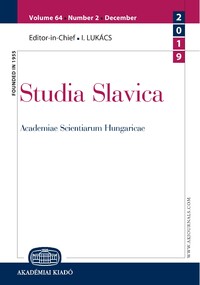В дополнение к списку межславянских лексических заимствований в русском приказном языке XVII в
In Addition to the List of Inter-Slavic Lexical Borrowings in the 17th-Century Russian Chancellery Language
Author(s): Liudmila Pavlovna GarbulSubject(s): Baltic Languages
Published by: Akadémiai Kiadó
Keywords: inter-Slavic borrowings; lexical borrowings; Polonisms; chancellery language; diplomatic correspondence; diplomatic documents; the written language of the Great Duchy of Lithuania; “prostaya mova”
Summary/Abstract: This paper is devoted to the problems of complex inter-Slavic language contacts in the 17th century and continues the author’s cycle of publications on this topic. The study is based on historical and philological methods that help to establish the direction of language influence when genetically related languages contact. The successful application of these methods is facilitated by the use of historical dictionaries of the West Slavic and East Slavic languages with a great depth of diachrony and a wide range of written monuments of different genres and various origins. This information helps to identify inter-Slavic language borrowings and verify the results of previous studies. The paper examines the origin and history of four words found in the Muscovite diplomatic correspondence: navezenie ‘captivity, imprisonment’, nadariti / nadaryti ‘to give, to bestow’, novokreščeniec ‘neophyte; Anabaptist’, novoobrannyj ‘newly elected’ in all contacting languages: Russian, Polish, the written language of the Grand Duchy of Lithuania as well as Belarusian and Ukrainian. The author aims at proving that these words are lexical borrowings from the Polish language. The study is based on a careful comparison of data of various types of dictionaries of the Russian, Belarusian, Ukrainian, and Polish languages, which made it possible to prove the foreign origin of these tokens in the Russian language and to establish the source of borrowings as well as to identify the intermediary role of the written language of the Grand Duchy of Lithuania in Polish–Russian language contacts. As a result of the study, it was found that all four lexemes are Polonisms. It was also established that the words nadariti / nadaryti, novokreščeniec, and novoobrannyj were introduced to the Russian written language of the 17th century, most likely due to the mediation of the written language of the Grand Duchy of Lithuania. In addition, the time of appearance of the word nadariti / nadaryti in the Russian written language was specified, and an earlier chronology was established for the word novoobrannyj. The materials in this publication can be used to supplement and clarify the information of the etymological and historical dictionaries of the Slavic languages.
Journal: Studia Slavica Academiae Scientiarum Hungaricae
- Issue Year: 65/2020
- Issue No: 1
- Page Range: 39-49
- Page Count: 11
- Language: Russian
- Content File-PDF

